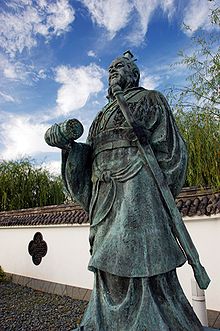OK, this isn't really about how to lose - it's about how to avoid losing. Take some advice from two books that make a study of winning and losing in war - first How to Lose a Battle by Bill Fawcett, (ISBN 9780060760243) followed by 'commentary' from The Art of War by Sun Tzu.
 |
| The man with the Plan. |
Confirm all intelligence reports – don't believe everything at first glance. Sun Tzu says: Without subtle ingenuity of mind, one cannot make certain of the truth of their (spies') reports. (XIII, 17)
Always try to take away your enemy's advantages. Sun Tzu says: Attack him where he is unprepared, appear where you are not expected. (I, 24)
Lack of decisiveness is fatal. Sun Tzu says: There are five dangerous faults that may affect a general: Recklessness, cowardice, a hasty temper, honor which is sensitive to shame and over-solicitude for his men. (VIII, 12)
Disorganized troops are ineffective troops Sun Tzu says: Maneuvering with an army is advantageous; with an undisciplined multitude, most dangerous. (VII, 5)
Scouting is critical – know where your enemy is and what he's doing. Sun Tzu says: By discovering the enemy's dispositions and remaining invisible ourselves, we can keep our forces concentrated while the enemy's must be divided. (VI, 13)
It is as dangerous to underestimate your enemy as it is to overestimate him. Sun Tzu says: Which of the generals has the most ability . . . on which side is discipline most rigorously enforced . . . on which side are the officers and men more highly trained? By means of these . . . I can forecast victory or defeat. (I, 13-14)
Orders to subordinates should be clear and simple. Sun Tzu says: When his (the general's) orders are not clear and distinct . . . the result is utter disorganization. (X, 18)
You can surrender an advantage now if it means that your enemy will give you an advantage later. Sun Tzu says: hold out specious allurements and make them (enemy chiefs) rush to any given point. (VIII, 10)
Make the terrain work for you, whether you hold it or not. Sun Tzu says: That general is skillful in attack whose opponent does not know what to defend; and he is skillful in defense whose opponent does not know what to attack. (VI, 8)
Build flexibility and alternatives into your plan. Sun Tzu says: Do not repeat the tactics which have gained you one victory, but let your methods be regulated by the infinite variety of circumstances. (VI, 28)
Expect that your plan will have to be revised once you see what the enemy is doing. Sun Tzu says: If, on the other hand, in the midst of difficulties we are always ready to seize an advantage, we may extricate ourselves from misfortune. (VIII, 9)
Three ways to lose a battle you should win:
Be overconfident. Sun Tzu says: IF you know neither the enemy nor yourself, you will succumb in every battle. (III, 18)
Fail to view intelligence data. Sun Tzu says: Hence it is . . . the wise general who will use the highest intelligence of the army . . . and thereby they achieve great results. (XIII, 27)
Fail to employ appropriate security measures. Sun Tzu says: Hence the skillful fighter puts himself into a position where defeat is impossible, and does not miss the moment for defeating the enemy. (IV, 14)
I would say, in summary, that the victorious side is the one that has the most information about its own side and the opponent, and makes the most use of that information.
No comments:
Post a Comment